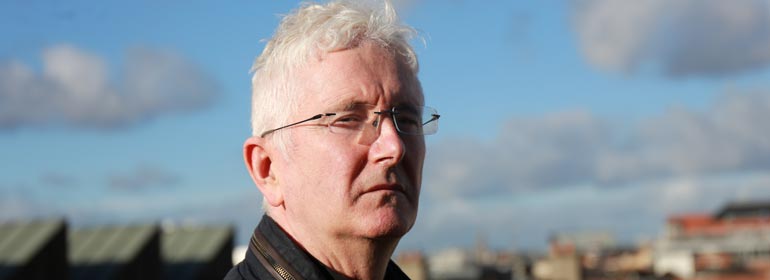In Paul Kennedy’s play, ‘The Best Place For Love’, a pair of ex-seminarians try to make sense of their erotic entanglement while studying for the priesthood. We asked him some pertinent questions.
Hey Paul, in no more than ten words describe the plot of ‘The Best Place For Love’.
A businessman buys a work of art and destroys the people he loves.
We hear there’s a liaison between to Maynooth seminarians involved. Tell us more!
Frank is a financial investor and Mick is a struggling artist. They met as seminarians 20 years earlier and during that time there was an erotic entanglement that never reached closure. In a drink-fueled evening of unguarded talk, they fumble their way towards some kind of half-assed resolution
Is it a response to the recent Maynooth Grindr scandal?
No, the play was written in 2014, long before the recent publicity surrounding Maynooth seminarians. But I don’t think it was really a surprise that men cloistered together in an enclosed space over a long period of time might somehow find each other attractive.
What are the underlying themes of the play?
How we can mistakenly trust our gut instincts and the terrible consequences that this can have. Also, the enduring nature of love, and how it can survive even after tragedy and death.
What’s the last Irish play you saw, and what did you think of it?
The Beach by Brokentalkers at the Project Arts Centre. I’m a big fan of their work, especially the incredibly moving ‘Blue Boy’.
The Beach was beautifully designed and performed, and the story’s theme of fear of outsiders set in the context of the refugee crisis was worthy and timely. I didn’t learn anything new; but it was a delight to spend an evening in their company.
What’s your favourite play of all time and why?
I think Happy Days by Samuel Beckett because it’s about our compulsive need to make life out to be better than it really is. It’s about the lies we tell ourselves to get through the day. Also, it’s very funny, and of course, Beckett’s language is soaring and majestical even while digging in the trash can of our demented humanity. Strangely though, it gives us the courage we need to keep on living. I could almost go so far as to say it cheers us up. Beckett said: ‘There is nothing funnier than unhappiness’; I like plays that are simultaneously happy and sad.
Who is your biggest influence?
My biggest influence is my family and especially my mother, who understands people and the world both truthfully and tenderly.
If you were to bring five famous people to dinner who would they be and why would you invite them?
David Mamet – I’d like to chat to him about his experiences in Chicago when he was starting out as a playwright and also pay tribute to his great play Glengarry Glen Ross.
Frank McGuinness I’ve always wanted to have a pint with Frank and chat to him about life and about the theatre. I’ve never met him, but I know he’s passionate and witty.
Pauline Kael – I have been reading Pauline Kael’s film reviews since I was a teenager. When reviewing movies she is sharp-minded, unforgiving and scathing, but also insightfully witty and full of an exalted love of art and cinema.
Brian Cowen – I heard he’s very good at doing impressions of other politicians and I’d like to ask him about the incident when some joker illegally hung a nude painting of him in the National Gallery.
Penny Arcade – she is a vivacious provocateur from New York who does a wickedly witty show full of outrageous humour and uncomfortable truth. Also, she has amazing carrot-coloured hair. (See The Outmost’s recent interview with Penny here.)
If the world were ending tomorrow, what would you do today?
I’d tell all the people who I love that I love them.
The meaning of life according to Paul…
Try your best and forgive yourself when you make mistakes. Also, never make final judgements on other human beings; there is always something that we don’t know. Keep searching. Keep learning.
‘The Best Place for Love’ by Paul Kennedy runs from the 14th-26th of November in The New Theatre, Temple Bar, tickets: €16 (€12.50 conc.) via the box office (01) 670 3361 or here.
© 2016 GCN (Gay Community News). All rights reserved.

comments. Please sign in to comment.